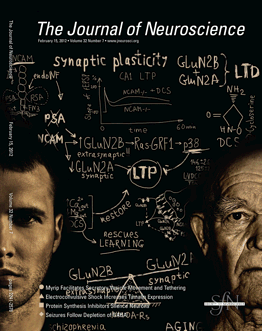导读:耶鲁等研究人员发现,青少年第一次接触可卡因时,为了最大限度降低毒品的影响,他们的大脑会产生防御反应。耶鲁团队的两项最新研究确定了调控这种防御反应的关键基因,并发现干扰这个防御反应会显著地增加老鼠对可卡因的敏感度。

耶鲁等研究人员发现,青少年第一次接触可卡因时,为了最大限度的降低毒品的影响,他们的大脑会产生防御反应。耶鲁团队的两项最新研究确定了调控这种防御反应的关键基因,并发现干扰这个防御反应会显著地增加老鼠对可卡因的敏感度。
这项研究或有助于解释,为什么在青少年时期开始使用可卡因,毒品滥用和上瘾的风险会增加。研究结果发表在2月14日和21日的the Journal of Neuroscience上。
包括耶鲁在内的研究人员发现,大脑处在从爆发式塑性生长阶段向神经连接更准确稳定的成年阶段过渡的青少年更容易受可卡因的影响。耶鲁先前的研究发现青少年时期的神经元和突触连接第一次接触可卡因时会发生形状改变,而这种改变是通过integrin beta1基因调控的分子途径实现的,integrin beta1对脊椎动物神经系统的发育至关重要。
Anthony Koleske说“这表明这些观察到的结构上的改变可能是神经线路的自我防护,即是神经元第一次接触可卡因的自我保护。” Anthony Koleske是生物物理学、生物化学和神经生物学的教授,也是两篇论文的主要作者。
在最新的研究中,耶鲁研究人员发现,相比完整通路的老鼠,敲除这种分子途径的老鼠大约需要1/3的可卡因就会诱发行为的改变。
研究人员表示,人的integrin beta1通道的相对强弱或可以解释,为什么一些可卡因使用者最终药物上瘾,而另一些人避开最坏的影响。Koleske说,如果变得完全对可卡因不敏感,就没有理由去寻找毒品。
Koleske、 Jane R. Taylor与其他耶鲁研究人员合作,寻找其他可能保护大脑免受可卡因和其他药物滥用影响的基因。

Arg Kinase Regulates Prefrontal Dendritic Spine Refinement and Cocaine-Induced Plasticity
Shannon L. Gourley, Anastasia Olevska. Sloan Warren, Jane R. Taylor, and Anthony J. Koleske
Adolescence is characterized by vulnerability to the development of neuropsychiatric disorders including drug addiction, as well as prefrontal cortical refinement that culminates in structural stability in adulthood. Neuronal refinement and stabilization are hypothesized to confer resilience to poor decision making and addictive-like behaviors, although intracellular mechanisms are largely unknown. We characterized layer V prefrontal dendritic spine development and refinement in adolescent wild-type mice and mice lacking the cytoskeletal regulatory protein Abl-related gene (Arg) kinase. Relative to hippocampal CA1 pyramidal neurons, which exhibited a nearly linear increase in spine density up to postnatal day 60 (P60), wild-type prefrontal spine density peaked at P31, and then declined by 18% by P56–P60. In contrast, dendritic spines in mice lacking Arg destabilized by P31, leading to a net loss in both structures. Destabilization corresponded temporally to the emergence of exaggerated psychomotor sensitivity to cocaine. Moreover, cocaine reduced dendritic spine density in wild-type orbitofrontal cortex and enlarged remaining spine heads, but arg−/− spines were unresponsive. Local application of Arg or actin polymerization inhibitors exaggerated cocaine sensitization, as did reduced gene dosage of the Arg substrate, p190RhoGAP. Genetic and pharmacological Arg inhibition also retarded instrumental reversal learning and potentiated responding for reward-related cues, providing evidence that Arg regulates both psychomotor sensitization and decision-making processes implicated in addiction. These findings also indicate that structural refinement in the adolescent orbitofrontal cortex mitigates psychostimulant sensitivity and support the emerging perspective that the structural response to cocaine may, at any age, have behaviorally protective consequences.
文献链接:https://www.jneurosci.org/content/32/7/2314.abstract?sid=2fe41ce7-1a79-4eb4-b3d9-f0f48c23426c








